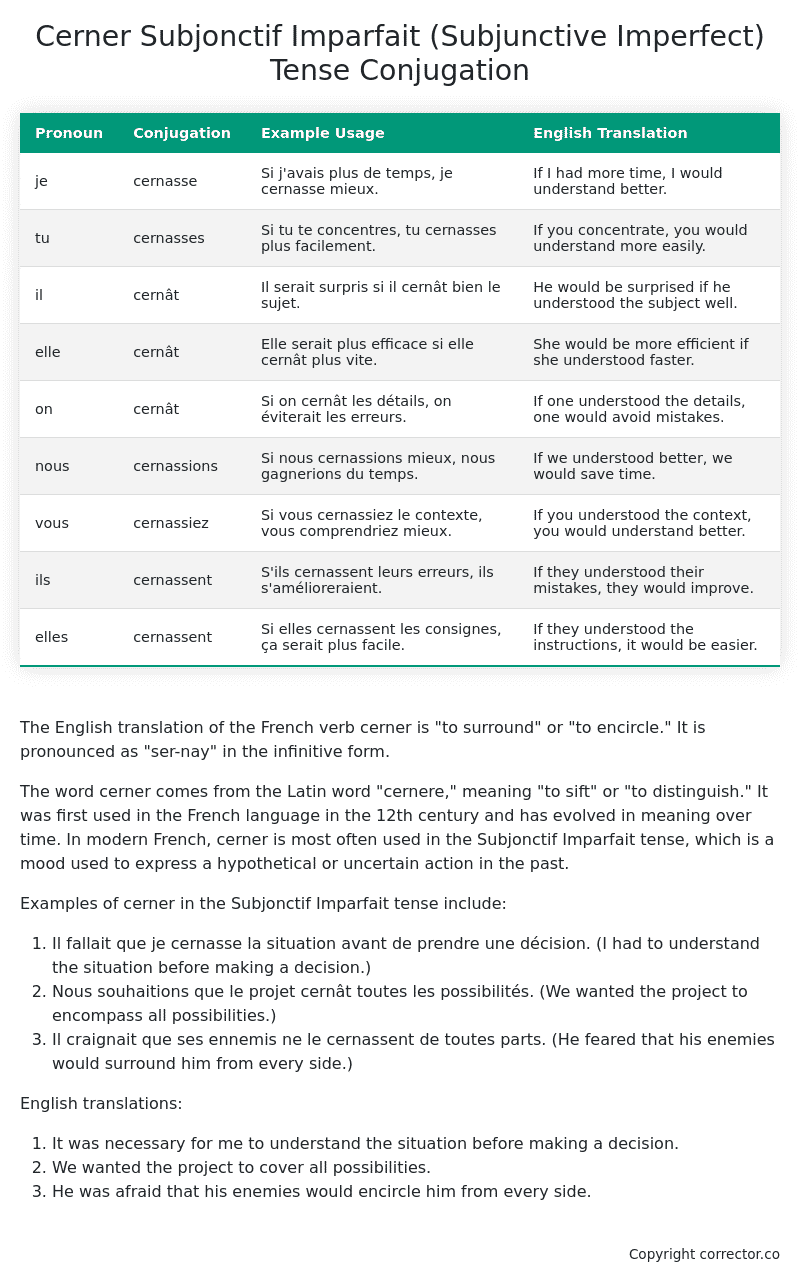Subjonctif Imparfait (Subjunctive Imperfect) Tense Conjugation of the French Verb cerner
Introduction to the verb cerner
The English translation of the French verb cerner is “to surround” or “to encircle.” It is pronounced as “ser-nay” in the infinitive form.
The word cerner comes from the Latin word “cernere,” meaning “to sift” or “to distinguish.” It was first used in the French language in the 12th century and has evolved in meaning over time. In modern French, cerner is most often used in the Subjonctif Imparfait tense, which is a mood used to express a hypothetical or uncertain action in the past.
Examples of cerner in the Subjonctif Imparfait tense include:
- Il fallait que je cernasse la situation avant de prendre une décision. (I had to understand the situation before making a decision.)
- Nous souhaitions que le projet cernât toutes les possibilités. (We wanted the project to encompass all possibilities.)
- Il craignait que ses ennemis ne le cernassent de toutes parts. (He feared that his enemies would surround him from every side.)
English translations:
- It was necessary for me to understand the situation before making a decision.
- We wanted the project to cover all possibilities.
- He was afraid that his enemies would encircle him from every side.
Table of the Subjonctif Imparfait (Subjunctive Imperfect) Tense Conjugation of cerner
| Pronoun | Conjugation | Example Usage | English Translation |
|---|---|---|---|
| je | cernasse | Si j’avais plus de temps, je cernasse mieux. | If I had more time, I would understand better. |
| tu | cernasses | Si tu te concentres, tu cernasses plus facilement. | If you concentrate, you would understand more easily. |
| il | cernât | Il serait surpris si il cernât bien le sujet. | He would be surprised if he understood the subject well. |
| elle | cernât | Elle serait plus efficace si elle cernât plus vite. | She would be more efficient if she understood faster. |
| on | cernât | Si on cernât les détails, on éviterait les erreurs. | If one understood the details, one would avoid mistakes. |
| nous | cernassions | Si nous cernassions mieux, nous gagnerions du temps. | If we understood better, we would save time. |
| vous | cernassiez | Si vous cernassiez le contexte, vous comprendriez mieux. | If you understood the context, you would understand better. |
| ils | cernassent | S’ils cernassent leurs erreurs, ils s’amélioreraient. | If they understood their mistakes, they would improve. |
| elles | cernassent | Si elles cernassent les consignes, ça serait plus facile. | If they understood the instructions, it would be easier. |
Other Conjugations for Cerner.
Le Present (Present Tense) Conjugation of the French Verb cerner
Imparfait (Imperfect) Tense Conjugation of the French Verb cerner
Passé Simple (Simple Past) Tense Conjugation of the French Verb cerner
Passé Composé (Present Perfect) Tense Conjugation of the French Verb cerner
Futur Simple (Simple Future) Tense Conjugation of the French Verb cerner
Futur Proche (Near Future) Tense Conjugation of the French Verb cerner
Plus-que-parfait (Pluperfect) Tense Conjugation of the French Verb cerner
Passé Antérieur (Past Anterior) Tense Conjugation of the French Verb cerner
Futur Antérieur (Future Anterior) Tense Conjugation of the French Verb cerner
Subjonctif Présent (Subjunctive Present) Tense Conjugation of the French Verb cerner
Subjonctif Passé (Subjunctive Past) Tense Conjugation of the French Verb cerner
Subjonctif Imparfait (Subjunctive Imperfect) Tense Conjugation of the French Verb cerner (this article)
Subjonctif Plus-que-parfait (Subjunctive Pluperfect) Tense Conjugation of the French Verb cerner
Conditionnel Présent (Conditional Present) Tense Conjugation of the French Verb cerner
Conditionnel Passé (Conditional Past) Tense Conjugation of the French Verb cerner
L’impératif Présent (Imperative Present) Tense Conjugation of the French Verb cerner
L’infinitif Présent (Infinitive Present) Tense Conjugation of the French Verb cerner
Struggling with French verbs or the language in general? Why not use our free French Grammar Checker – no registration required!
Get a FREE Download Study Sheet of this Conjugation 🔥
Simply right click the image below, click “save image” and get your free reference for the cerner Subjonctif Imparfait tense conjugation!

Cerner – About the French Subjonctif Imparfait (Subjunctive Imperfect) Tense
Formation
Common Everyday Usage Patterns
Interactions with Other Tenses
Subjonctif Présent
Indicatif Passé Composé
Conditional
Conditional Perfect
Summary
I hope you enjoyed this article on the verb cerner. Still in a learning mood? Check out another TOTALLY random French verb conjugation!


